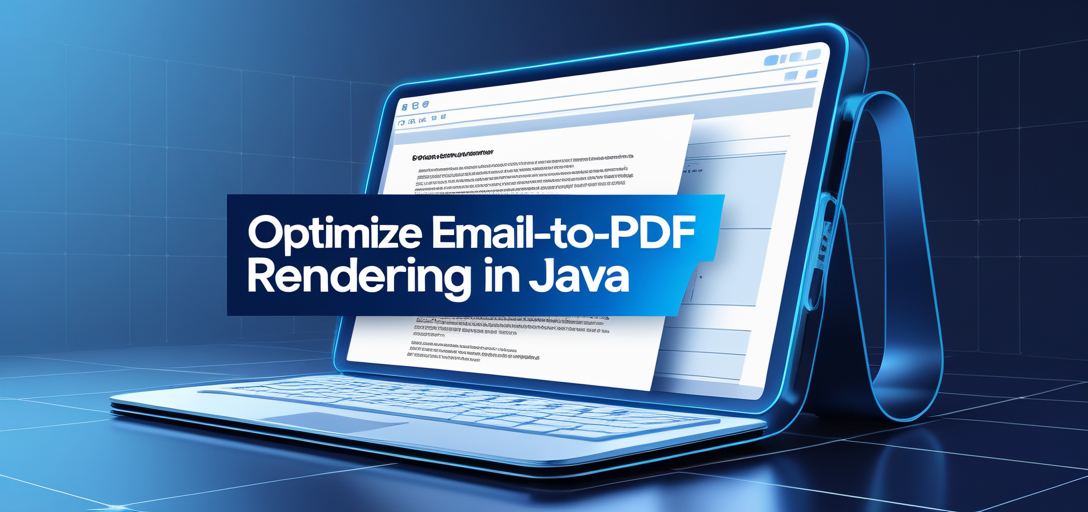Optimize Email-to-PDF Rendering in Java with GroupDocs.Viewer API
Introduction
Are you looking to seamlessly convert email messages into PDF format using Java? This tutorial will guide you through optimizing page size for rendering emails to PDF with the GroupDocs.Viewer API, a feature-rich tool designed specifically for such tasks. Whether you’re dealing with MSG files or other email formats, this solution simplifies your workflow and ensures consistent output.

In this tutorial, we’ll explore how to adjust the page size when rendering emails using GroupDocs.Viewer Java, allowing for greater customization and control over the output format. By leveraging this powerful API, you can streamline document conversion processes in your applications with ease.
What You’ll Learn:
- How to set up GroupDocs.Viewer for Java
- Configuring PDF view options to adjust email rendering page size
- Implementing code snippets for practical use cases
- Optimizing performance and managing resources effectively
Now, let’s dive into the prerequisites you’ll need before getting started.
Prerequisites
Required Libraries, Versions, and Dependencies
To follow along with this tutorial, ensure that you have the following:
- Java Development Kit (JDK) 8 or higher installed on your machine.
- Maven build automation tool to manage dependencies.
- GroupDocs.Viewer for Java library version 25.2.
Environment Setup Requirements
Make sure you have a suitable Integrated Development Environment (IDE), such as IntelliJ IDEA, Eclipse, or NetBeans, set up for Java development.
Knowledge Prerequisites
A basic understanding of Java programming and familiarity with Maven project setup will be beneficial to follow this tutorial effectively.
Setting Up GroupDocs.Viewer for Java
To get started with GroupDocs.Viewer for Java, you’ll need to include the necessary dependencies in your Maven pom.xml file. Here’s how:
Maven Configuration:
<repositories>
<repository>
<id>repository.groupdocs.com</id>
<name>GroupDocs Repository</name>
<url>https://releases.groupdocs.com/viewer/java/</url>
</repository>
</repositories>
<dependencies>
<dependency>
<groupId>com.groupdocs</groupId>
<artifactId>groupdocs-viewer</artifactId>
<version>25.2</version>
</dependency>
</dependencies>
License Acquisition
GroupDocs offers various licensing options:
- Free Trial: Test the API with limited functionality.
- Temporary License: Obtain a temporary license for full access during development.
- Purchase: Acquire a permanent license for commercial use.
To obtain a free trial or temporary license, visit GroupDocs’ purchase page.
Basic Initialization and Setup
After configuring your Maven project, you can initialize the Viewer class to start rendering documents:
import com.groupdocs.viewer.Viewer;
try (Viewer viewer = new Viewer("path/to/your/document.msg")) {
// Perform operations with the viewer instance.
}
Implementation Guide
Adjusting Page Size for Email Rendering
This feature focuses on customizing the page size when converting email messages to PDF. By default, emails may render in various formats; however, setting a specific page size ensures consistency across documents.
Step 1: Define Output Directory and File Path
First, establish where your rendered document will be saved:
import java.nio.file.Path;
import java.nio.file.Paths;
Path YOUR_OUTPUT_DIRECTORY = Paths.get("YOUR_OUTPUT_DIRECTORY");
Path filePath = YOUR_OUTPUT_DIRECTORY.resolve("output.pdf");
Step 2: Configure PdfViewOptions
Set up options to customize the rendering process, specifically defining the page size:
import com.groupdocs.viewer.options.PdfViewOptions;
import com.groupdocs.viewer.options.PageSize;
PdfViewOptions viewOptions = new PdfViewOptions(filePath);
viewOptions.getEmailOptions().setPageSize(PageSize.A4); // Customize page size for email messages
Step 3: Render the Email Message to PDF
Finally, render your email message using the configured options:
try (Viewer viewer = new Viewer("YOUR_DOCUMENT_DIRECTORY/SAMPLE_MSG")) {
viewer.view(viewOptions);
}
// The rendered document is saved in YOUR_OUTPUT_DIRECTORY
Explanation of Code Parameters and Methods
- PdfViewOptions: Manages how emails are converted to PDF, allowing configuration of page size.
- setPageSize(PageSize.A4): Adjusts the rendering output to A4 paper size for consistency.
Practical Applications
Here are some practical applications where this feature can be beneficial:
- Business Communication Archives: Convert and archive business emails in a standardized PDF format for easy sharing and storage.
- Legal Document Management: Standardize email communications into PDFs for legal proceedings or documentation purposes.
- Customer Support Records: Maintain consistent records of customer support interactions by converting them to PDF.
- Integration with CRM Systems: Integrate this rendering functionality within Customer Relationship Management (CRM) systems to automatically convert emails received from clients.
Performance Considerations
Optimizing Performance
- Minimize memory usage by disposing of resources properly, as shown in the try-with-resources block.
- Configure JVM options to allocate sufficient heap space for large batch processing tasks.
Resource Usage Guidelines
Monitor resource consumption during rendering processes to ensure optimal performance. Adjust thread pools and manage background services effectively to avoid overloading your system.
Conclusion
By now, you should have a solid understanding of how to optimize email-to-PDF rendering using GroupDocs.Viewer Java API. Remember to customize page sizes as needed for your specific use cases to maintain consistency across documents. As next steps, consider exploring additional features offered by GroupDocs.Viewer, such as watermarking and document layer management.
Feel free to experiment further with the code examples provided and integrate them into your existing projects.
FAQ Section
What is GroupDocs.Viewer Java?
- GroupDocs.Viewer for Java is a powerful API that allows developers to render documents in various formats, including PDF.
How can I adjust the page size when rendering emails?
- Use
PdfViewOptionsand set the page size viasetPageSize()method with desired dimensions likePageSize.A4.
- Use
Can I use GroupDocs.Viewer for commercial projects?
- Yes, you need to purchase a license for commercial use.
What formats can be converted using this API?
- GroupDocs.Viewer supports a wide range of document formats including DOCX, PDF, XLSX, and email message formats like MSG.
Is there support for customizing the rendered PDFs?
- Yes, customization options such as watermarking, rotation, and layer management are available.
Resources
- GroupDocs.Viewer Documentation
- API Reference
- Download GroupDocs.Viewer for Java
- Purchase License
- Free Trial
- Temporary License
- Support Forum
Feel free to explore these resources for further learning and support. Happy coding!